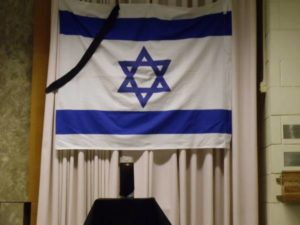In Joshua's Shoes: The National Holidays
I was surprised to see that the sanctuary was full when I walked into Murstein Synagogue on Yom HaShoah. The HUC Year in Israel Class, Israeli Rabbinic Program and many people from the community had arrived to mark this somber day. The service and ceremony had been developed and planned by a group of students from both programs and we finished with just enough time for us to gather in the street and wait.
Many of us were talking, waiting for 10:00. The sirens sounded. Buses and cars stopped where they were and opened their doors. Cars topped in the middle of the street and everyone, most of them wearing dark pants and a white shirt (the traditional clothing for the day), stopped and stood at attention. An eerie silence surrounded us even though the air was filled with a whine that reminded me of tornado sirens.
During the ceremony that followed, I learned that many people around me still had a very real, very direct connection to the Holocaust. Although we did not have regular classes, we spent the remainder of the class day exploring the wide variety of meanings embedded in Yom HaShoah.
Not only did we talk about the universal message of the Shoah, we discussed what aspects we choose to emphasize. I was surprised to learn that the official name of the Yom HaShoah is actually Yom HaZikaron LaShoah v’HaGevurah, Remembrance Day of the Holocaust and the Heroism. I am still trying to decide where we go from here. Do we remember the tragedy? Do we remember the heroic stories of resistance? How do you combine both feelings and messages?
The next day Israel was back to normal, for a week.
Yom HaZikaron
Wearing the national uniform (black pants with a white shirt), my class reassembled for memorial service to mark those that have fallen in defense of Israel, in far too many wars. This morning the feeling in the air was different, it was as if the memories were more personal. During T’fillah our teachers shared the memories of some of their friends that died in the service of the IDF. It was much more challenging to hear their stories than I had anticipated.
But as we were walking towards Gymnasia Rehavia, a high school near HUC where we participated in their ceremony, I kept thinking about Memorial Day in the USA. I can’t remember the last time I’ve actually done something to memorialize the fallen soldiers of the USA, and I was not unique in this thought.
It was powerful, hearing the names of everyone associated with that high school who had died, especially with parents, graduates – some dressed in their military uniforms – and the entire student body present. This was even more powerful after we had the opportunity to walk through their memorial that is erected every year.
The transition between mourning and celebration I have always heard is an interesting one to witness. 8:00 PM is the official transition time from Yom HaZikaron to Yom HaAtzmaut, but the real transition is a little bit slower.
Yom HaAtzmaut
Leaving my apartment at 9:00 to see the party in the streets, there were many more people out on a Tuesday night in the city center. The Israeli Flags, that had been popping up like the spring flowers, were now draped down the sides of buildings on people’s backs like capes and just about anywhere you could think of.
It took an hour or so, but eventually Ben Yehudah Street and Jaffa Road were packed with people celebrating. People were bashing friends and strangers over the head with plastic hammers, starting silly-string or foam fights, listening to the free concert in Kikar Tzion, dancing Folk Dances in front of the Municipality building or just out enjoying the excited atmosphere of the night.
When went out the next afternoon to meet a bunch of friends for a barbeque in the park, I had expected to find people barbecuing all over the place. What I did not expect was that just about every square foot of grass had a group of people celebrating Independence Day.
The tiny, one time use barbeque pits had popped up like dandelions and it wasn’t unusual to see tents that had been set up the night before to ensure they would have a place in the morning.
I have to admit, there is nothing quite like celebrating Yom Ha’Atzmaut here, especially after Memorial Day and Holocaust Remembrance Day leading up to it. In the course of eight days you experience quite the range of emotions.
At the risk of sounding trite, I will always remember these three days as an amazing part of my year here and I hope I can pack these feelings into the bags and boxes I’m filling this week.
Shalom From Jerusalem,






